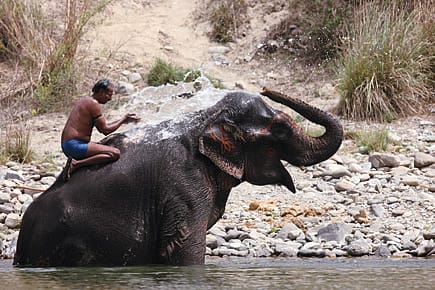Trunk Calls to Jaldapara

For two elephants who've been relocated to Japan, a CD is their only connection to home.
Every now and then, two mahouts working in the Jaldapara wildlife sanctuary in the Dooars region of north Bengal get a call from the Kodomo-no-Kumi zoo in Okinawa, Japan. On the other line are nine-year-old Devi and seven-year-old Rahul. They are two elephants who were born in captivity in the Indian wildlife sanctuary and now reside at Okinawa. When Devi and Rahul look depressed or become temperamental, their Japanese caretakers call the animals' former mahouts, Dinabandhu Barman and Kharka Bahadur Biswakarma. Barman and Biswakarma coo to their ex-wards, sing to them and ask them to be 'good boys'. And the elephants calm down immediately.
Devi and Rahul were taken on an Air India flight to Okinawa in December 2007. Their mahouts went along and spent six months with them—a standard practice when relocating elephants. Things were fine as long as the mahouts were there. But once they left, Rahul and Devi, both playful, became depressed and temperamental, refusing to obey their Japanese handlers. They would go without food, even stomp around in anger. The zoo authorities then called up the Jaldapara wardens and sought help.
A forest department officer came up with the idea of letting the mahouts talk to the Okinawa-resident animals via mobile phone. The first time the elephants heard their mahouts, they were elated. Following this, whenever the two young elephants acted up, a call was made to Jaldapara. The tactic generally worked, but since making international phone calls to India every few weeks was proving expensive, the Japanese requested Jaldapara officials to dispatch a CD with the voices of the two mahouts.
Imran Khan: Pakistan’s Prisoner
27 Feb 2026 - Vol 04 | Issue 60
The descent and despair of Imran Khan
The CD, with recordings of the two mahouts speaking, singing the folk songs and lullabies they used to sing to Rahul and Devi, were sent to Okinawa a few months ago. Now, whenever Rahul and Devi are homesick, the Okinawa zoo officials play the CD, immediately calming the pachyderms.
But at times, that still doesn't work and calls have to be made to Jaldapara. What makes the situation worse is the fact that Rahul and Devi, though born in captivity, were used to open spaces, but in Okinawa, they're kept in an enclosure that is clearly too small for them. In fact, Okinawa zoo has often been criticised for keeping its animals in cramped enclosures. A few years ago, a global campaign was launched from the US to shift Kei, a North American timberwolf, from its tiny enclosure in Okinawa zoo to a sanctuary in Colorado. But now that Devi and Rahul are in Japan, a CD is their best chance of succour.
